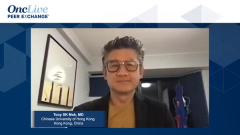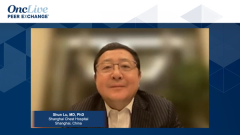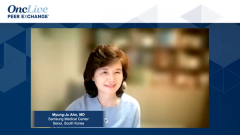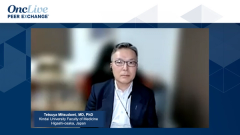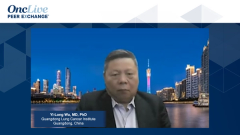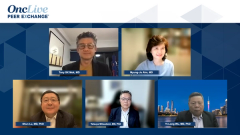
Is There a Continued Role for First-Generation TKIs in Resectable NSCLC?
Experts consider if there’s a role for the continued use of first-generation TKIs in patients with resected EGFR-positive non–small cell lung cancer.
Episodes in this series

Transcript:
Tony S.K. Mok, MD: Let me bring up another controversial point that Shun has brought out. Icotinib is approved in China. On top of that, gefitinib and erlotinib have been studied in the adjuvant setting. But in view of the ADAURA trial, should we allow a first-generation TKI [tyrosine kinase inhibitor] to be used as an adjuvant therapy? The data from the IMPACT study in Japan were entirely negative. The overall survival benefit from CTONG 1104 is also negative. Does that still have a role? If I offer a first-generation [TKI], is it criminal to do that?
Shun Lu, MD, PhD: We have 3 randomized studies for first generation. One is for a third-generation TKI, osimertinib. Overall, there’s no overall survival benefit. For the first-generation TKIs, there are 2 studies: a relatively short follow-up CTONG 1104 study, as well as the adjuvant study show these 3 survival benefits. But the Japanese study had longer follow-up. There’s no difference. There’s no difference between the 2 arms in terms of disease-free survival [DFS] and overall survival. Although there’s a dispute with the lack of overall survival data, I don’t know that we can get positive results for ADAURA in terms of overall survival. In China, we approved the 2, a first-generation TKI and a second-generation TKI. But their reimbursement covers only first-generation TKI. Osimertinib will be not approved by the reimbursement. So it’s a rarity, but the first-generation TKI can—the 2 studies show this—delay the progression. That’s based on economic toxicity or something. Why do they use a first-generation TKI in the adjuvant setting in China?
Tony S.K. Mok, MD: Yi-Long, you’re the leader of ADUARA. Your government approved first-generation TKI but not the third generation. What do you say about that?
Yi-Long Wu, MD, PhD: The Chinese government approved the 2 indications based on the EVIDENCE trial, which has a head-to-head comparison of icotinib vs chemotherapy. This is a positive clinical trial, so the Chinese government approved this indication. ADUARA is also a recent clinical trial. After the chemotherapy, we give the patient osimertinib. The difference is the reimbursement system for icotinib. In clinical practice, it’s important to depend on the financial situation. The IMPACT trial and the adjuvant trial show that if the patient is resistant to gefitinib, and we have to continue the TKI, then the overall survival is not reached. In this case, overall survival is superior. We have so many the questions and no answers. We need more data. In this setting you could choose icotinib or gefitinib. You also could choose osimertinib.
Tony S.K. Mok, MD: Yi-Long, when will you have the overall survival data from ADAURA?
Yi-Long Wu, MD, PhD: In my opinion, these are positive data. The FDA commented on this…. Sequencing the treatment has not been convincing to test the overall survival results. But this is only the DFS. The FDA commented on the report indication based only on DFS.
Tony S.K. Mok, MD: I’m looking forward to the overall survival data even though they’re not as clean as they’re supposed to be. They certainly will give us a little more idea. There’s 1 other important point that we’re not touching on. Osimertinib has a CNS [central nervous system] penetration. For the first generation, even icotinib, they claimed some CNS, but CNS isn’t as high as osimertinib. Today there’s only 2% CNS recurrence rate. In the Japanese IMPACT study, the CNS recurrence rate is 26%. I predict that the CNS protection will probably contribute to the overall benefit of the drug. I wonder whether that CNS consideration would be the 1 that distinguished between the first- and third-generation drugs.
Yi-Long Wu, MD, PhD: Tony, I agree with you. At ESMO [European Society for Medical Oncology Congress], we approved 1 model to predict overall survival based on all the data. Overall survival is positive for the ADAURA trial.
Tony S.K. Mok, MD: Myung-Ju?
Myung-Ju Ahn, MD: I totally agree. That ADAURA study significantly reduced the brain metastases compared with control. However, when you look at the progression-free survival in CTONG 1104, the Japan study, and ADAURA, they use this as 2 or 3 years of the treatment. When you look at progression-free survival, the disease-free survival the curve is right after the treatment discontinuation. The disease-free survival curve drops rapidly. For the duration of treatment, we just delayed the relapse of the disease during the treatment. I don’t think EGFR-TKI really cures the disease. Not like immunotherapy. That’s my opinion. However, in the ADAURA study, the osimertinib has penetrated to the brain. That’s 1 of the major impacts for the why we use osimertinib as the adjuvant treatment.
Transcript edited for clarity.


